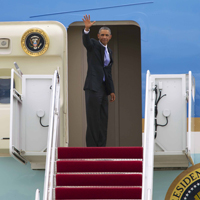
The Enough Project released its latest publication this week as President Obama travels to Kenya and Ethiopia. “President Obama in Africa: Countering Violent Kleptocracies is a Prerequisite for Peace” analyzes the Obama administration’s initiatives on issues of peace, security, atrocity prevention, democratic governance, investment, and economic growth as they relate to four focus countries where this administration has invested efforts in trying to resolve conflict: South Sudan, Sudan, the Democratic Republic of the Congo (Congo), and the Central African Republic (CAR). Achieving key objectives in regions of Africa that have been torn apart by deadly conflict requires a dedicated focus on the core source of instability and autocracy in these places: violent kleptocracies, which are highly corrupt systems closely linked to conflict.
President Obama’s trip to the region can set the tone for prioritizing new policy approaches to conflicts that had once seemed intractable. The following specific policy recommendations, outlined in the publication, should be a priority focus of the Obama administration coming out of the president’s trip to Africa:
- The United States, the U.N. Security Council, the African Union, and the European Union should prioritize targeted sanctions against individuals, companies, institutions, and other actors that facilitate grand corruption, participate in illicit natural resource trade (including conflict gold), and commit atrocities in conflict-affected areas in Africa. Particular efforts should be made to craft systemic strategies that leverage counter-terrorist financing, anti-money laundering, and transnational organized crime authorities in order to target entire networks of atrocity financing over the less effective one-off sanctions on individual commanders or companies.
- The United States and other donors should expand their existing efforts to build the technical capacity of African regional financial institutions beyond their current emphasis on countering money laundering and terrorist financing to also include a focus on international sanctions enforcement. Existing programs should be expanded to help enhance the operational capacity of regional financial intelligence units (FIUs). These FIUs are central national agencies responsible for receiving, analyzing, and transmitting disclosures on suspicious transactions to the competent authorities, making them the appropriate locus of expanded sanctions implementation activities.
- The Secretary of the Treasury should direct more resources towards African sanctions enforcement investigations in the Office of Foreign Assets Control (OFAC) and the Financial Crimes Enforcement Network (FinCEN), allowing them to focus on those suspected of facilitating grand corruption, participating in illicit natural resource trades, and committing atrocities in Africa’s deadliest conflicts.
- The United States, along with the European Union, the United Kingdom, and Canada, should lead efforts to disrupt and dismantle the elite networks that steal wealth from conflict-affected African countries. Specifically, the U.S. Department of Justice Asset Forfeiture and Money Laundering Section (AFMLS), in leading the Kleptocracy Asset Recovery Initiative, should investigate and locate the proceeds of grand corruption in conflict countries and use asset forfeiture provisions to recover those assets and return them to the countries and communities from which they were stolen. While in the region, President Obama should urge Kenya and Ethiopia to share intelligence and contribute actively to the asset recovery inter-agency network of eastern Africa to jump-start these efforts.
- The U.S. Office of Global Criminal Justice should encourage and support efforts to investigate and prosecute the war crime of pillage—theft in the time of war, including large-scale theft of natural resources and wildlife trafficking. The International Criminal Court (ICC), hybrid courts, and national prosecutors could more effectively pursue these pillage investigations and prosecutions with U.S. support. The United States, along with ICC states parties, should encourage ICC Chief Prosecutor Fatou Bensouda to revive the court’s financial crimes unit and appoint special advisors on financial forensics and natural resource theft as part of a comprehensive approach to investigating and prosecuting widespread pillage in South Sudan, Sudan, Congo, and CAR.
- The U.S. government should urge a greater number of African governments—including South Sudan, Rwanda, Uganda, and others—to join international regulatory institutions for high-value natural resources, such as the Extractive Industries Transparency Initiative (EITI). These governments should be encouraged to work to implement the practices of these regulatory institutions and initiatives and increase budget transparency.
- The United States should increase its democracy and governance support to diverse coalitions of people and nongovernmental organizations (NGOs) in the region that are actively seeking to hold their own leaders to account for economic crimes. The United States has a longstanding commitment to empowering those who advocate together for democratic political transformation, participatory governance, participation in peace processes, and greater government transparency, but funding for these efforts has fallen in recent years. USAID can support these communities by expanding local groups’ access to funding, training, and networking to strengthen their ability to expose mass corruption and the misappropriation of their countries’ natural resource wealth.
Photo Credit: AP Photo/Jose Luis Magana

